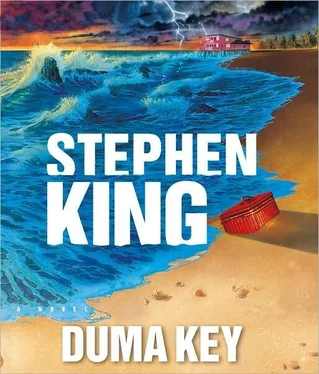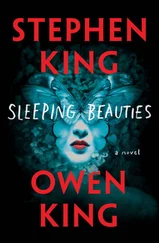“Enough!” Dario cried cheerily, striking fresh terror into my pounding heart and sending a cramp rolling through my miserable basement regions — terror above, barely held-in shit below. What a lovely combination. “It has been fifteen years since the Scoto added a new artist to its crowded spring calendar, and we have never introduced one in whom there has been greater interest. I think the slides you are about to see and the talk you are about to hear will explain our interest and excitement.”
He paused dramatically. I felt a poison dew of sweat spring out on my brow and wiped it off. The arm that I lifted seemed to weigh fifty pounds.
“Ladies and gentlemen, Mr. Edgar Freemantle, lately of Minneapolis—St. Paul, now of Duma Key.”
They applauded. It sounded like an artillery barrage going off. I commanded myself to run away. I commanded myself to faint. I did neither. Like a man in a dream — but not a good one — I walked onstage. Everything seemed to be happening slowly. I saw that every seat was taken but no seat was taken because they were on their feet, they were giving me a standing O. High above me, on the domed ceiling, angels flew in airy disregard of the earthly matters below, and how I wished I was one of them. Dario stood beside the podium, hand outstretched. It was the wrong one; in his own nervousness he had extended his right, and so my return handshake was awkward and bass-ackwards. My notes were crumpled briefly between our palms, then tore. Look what you did, you asshole, I thought — and for one terrible moment I was afraid I’d said it aloud for the mike to pick up and broadcast all over the room. I was aware of how bright the spotlight was as Dario left me there on my lonely perch. I was aware of the microphone on its flexible chrome rod, and thinking it looked like a cobra rising out of a snake-charmer’s basket. I was aware of bright points of light shining on that chrome, and on the rim of the water glass, and on the neck of the Evian bottle next to the water glass. I was aware that the applause was starting to taper off; some of the people were resuming their seats. Soon an expectant silence would replace the applause. They would wait for me to begin. Only I had nothing to say. Even my opening line had left my head. They would wait and the silence would stretch out. There would be a few nervous coughs, and then the murmuring would start. Because they were assholes. Just a bunch of lookie-loo assholes with rubber necks. And if I managed anything, it would be an angry torrent of words that would sound like the outburst of a man suffering from Tourette’s.
I’d just call for the first slide. Maybe I could do that much and the pictures would carry me. I’d have to hope they would. Only when I looked at my page of notes, I saw that not only was it torn straight down the middle, my sweat had blurred the jottings so badly I could no longer make them out. Either that or stress had created a short circuit between my eyes and my brain. And what was the first slide, anyway? A mailbox painting? Sunset with Sophora ? I was almost positive neither of those was right.
Now everyone was sitting. The applause was finished. It was time for the American Primitive to open his mouth and ululate. Three rows back, sitting on the aisle, was that nozzy birch Mary Ire, with what looked like a porthand shad open on her lap. I looked for Wireman. He’d gotten me into this, but I bore him no anus. I only wanted to apologize with my eyes for what was coming.
I’ll be in the front row, he’d said. Dead center.
And he was. Jack, my housekeeper Juanita, Jimmy Yoshida, and Alice Aucoin were sitting on Wireman’s left. And on his right, on the aisle —
The man on the aisle had to be a hallucination. I blinked, but he was still there. A vast face, dark and calm. A figure crammed so tightly into the plush auditorium seat it seemed it might take a crowbar to get him out again: Xander Kamen, peering up at me through his enormous horn-rimmed glasses and looking more like a minor god than ever. Obesity had canceled his lap, but balanced on the bulge of his belly was a ribbon-garnished gift box about three feet long. He saw my surprise — my shock — and made a gesture: not a wave but an odd, beneficent salute, putting the tips of his fingers first to his massive brow, then to his lips, then holding his hand out to me with the fingers spread. I could see the pallor of his palm. He smiled up at me, as if his presence here in the first row of the Geldbart Auditorium next to my friend Wireman were the most natural thing in the world. His large lips formed four words, one after the other: You can do this.
And maybe I could. If I thought away from this moment. If I thought sideways.
I thought of Wireman — Wireman looking west, to be exact — and my opening line came back to me.
I nodded to Kamen. Kamen nodded back. Then I looked at the audience and saw they were just people. All the angels were over our heads, and they were now flying in the dark. As for demons, most were probably in my mind.
“Hello—” I began, then recoiled at the way my voice boomed out from the microphone. The audience laughed, but the sound didn’t make me angry, as it would have a minute before. It was only laughter, and goodnatured.
I can do this.
“Hello,” I said again. “My name is Edgar Freemantle, and I’m probably not going to be very good at this. In my other life I was in the building trade. I knew I was good at that, because I landed jobs. In my current life I paint pictures. But nobody said anything about public speaking.”
This time the laughter was a little freer and a little more general.
“I was going to start by saying I have no idea how I wound up here, but actually I do. And that’s good, because it’s all I have to tell. You see, I don’t know anything about art history, art theory, or even art appreciation. Some of you probably know Mary Ire.”
This brought a chuckle, as if I’d said Some of you may have heard of Andy Warhol. The lady herself looked around, preening a little, her back ramrod straight.
“When I first brought some of my paintings into the Scoto Gallery, Ms. Ire saw them and called me an American primitive. I sort of resented that, because I change my underwear every morning and brush my teeth every night before I go to bed—”
Another burst of laughter. My legs were just legs again, not cement, and now that I felt capable of running away, I no longer wanted or needed to. It was possible they’d hate my pictures, but that was all right because I didn’t hate them. Let them have their little laugh, their little boo-and-hiss, their little gasp of distaste (or their little yawn), if that was what they wanted to do; when it was over, I could go back and paint more.
And if they loved them? Same deal.
“But if she meant I’m someone who’s doing something he doesn’t understand, that he can’t express in words because no one ever taught him the right terms, then she’s right.”
Kamen was nodding and looking pleased. And so, by God, was Mary Ire.
“So all that leaves is the story of how I got here — the bridge I walked over to get from my other life to the one I’m living these days.”
Kamen was patting his meaty hands together soundlessly. That made me feel good. Having him there made me feel good. I don’t know exactly what would have happened if he hadn’t’ve been, but I think it would have been what Wireman calls mucho feo — very ugly.
“But I have to keep it simple, because my friend Wireman says that when it comes to the past, we all stack the deck, and I believe that’s true. Tell too much and you find yourself… mmm… I don’t know… telling the past you wished for?”
Читать дальше










